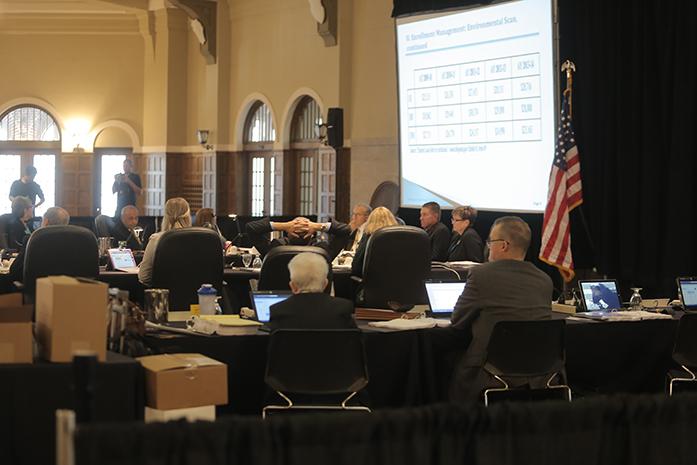The state Board of Regents is expected to faithfully oversee the state of Iowa’s three public universities (the University of Iowa, the University of Northern Iowa, and Iowa State University). In an ideal world, this nine-person board would further the academic excellence of our universities, find efficient ways to keep costs down, and remain transparent in any and all necessary dealings. It’s becoming increasingly clear that, with our current regents, this ideal is a fantasy.
On April 30, Regent Mary Andringa resigned, just one year into a six-year term. According to the Associated Press, Andringa said she underestimated the amount of time it would take to serve as a regent.
However, the announcement of Andringa’s sudden departure came the day after allegations of favoritism and conflicts of interest surfaced. Andringa, the CEO of Vermeer Corp., is also on the board of furniture manufacturer Herman Miller of Michigan, but she did not list her affiliation with the company on the regents’ required conflict-of-interest form when Gov. Terry Branstad appointed her last year.
Records obtained by AP show that the University of Iowa agreed to a no-bid contract with a local Herman Miller distributor, Pigott, on June 30, 2015, nearly two months after Andringa joined the regents. On July 6, 2015, Andringa updated her conflict-of-interest form to include her position with Herman Miller, according to AP.
The contract, worth millions, was advertised by the UI as “maximizing the UI’s buying power” and claimed the UIHC “save[d] big” through the furniture-purchasing deal, which had been renegotiated from a 2011 agreement with Pigott. Normally, the UI is required by law to seek bids for contracts worth more than $25,000. But since the original contract allowed for an extension, the UI didn’t seek other bids five years later.
However, the notion that awarding a contract to a bidder without allowing competition is “maximizing the UI’s buying power” doesn’t hold water. Whether or not Andringa’s position as a director of Herman Miller influenced the process of selecting a furniture distributor, it still reinforces the image of the regents (and, by extension, the UI) as an institution that conducts its business behind closed doors. At worst, deals such as this make our governing bodies and universities reek of cronyism, favoritism, and corruption, especially given past no-bid contracts that were conducted under similar circumstances.
In December, the AP revealed the UI had paid a company $322,000 to conduct polling on the university’s image. This, too, was tied to a previous contract: a 2013 deal awarded to Matt Strawn, a former Iowa GOP chairman. The problem? The UI paid Strawn $24,900, an insultingly arbitrary amount that seems entirely based on avoiding the $25,000 minimum that would trigger a bidding process.
The regents have said they plan to discuss the issue of no-bid contracts at their meeting in June. Given these recent events, it’s a discussion that’s overdue. Skirting state law and avoiding competition gives the appearance of corruption, and this perception reflects poorly on the UI. The Daily Iowan Editorial Board urges the regents to change their policies on no-bid contracts if they actually care about efficient spending at the universities they’ve been entrusted to oversee.



